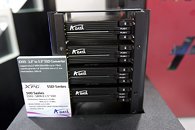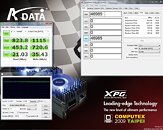- Joined
- Oct 9, 2007
- Messages
- 47,912 (7.37/day)
- Location
- Dublin, Ireland
| System Name | RBMK-1000 |
|---|---|
| Processor | AMD Ryzen 7 5700G |
| Motherboard | Gigabyte B550 AORUS Elite V2 |
| Cooling | DeepCool Gammax L240 V2 |
| Memory | 2x 16GB DDR4-3200 |
| Video Card(s) | Galax RTX 4070 Ti EX |
| Storage | Samsung 990 1TB |
| Display(s) | BenQ 1440p 60 Hz 27-inch |
| Case | Corsair Carbide 100R |
| Audio Device(s) | ASUS SupremeFX S1220A |
| Power Supply | Cooler Master MWE Gold 650W |
| Mouse | ASUS ROG Strix Impact |
| Keyboard | Gamdias Hermes E2 |
| Software | Windows 11 Pro |
A-DATA Technology Co., Ltd., a worldwide leading manufacturer in high-performance DRAM modules and Flash application products, presenting the killer speed of eight A-DATA S592 SSDs with XPG 3.5" converter configure in RAID 0 at Computex Taipei 2009. With the utilization of XPG 3.5" converter, the capacity can reach up to 1TB to perform 825 MB/s read and 1,115 MB/s write transfer rate.
The eight A-DATA S592 SSDs adopting the latest XPG EX93 3.5" SSD converter, equipped with safety lock mechanism that can easily secure the SSD/hard drive in 3.5"drive bay without purchasing any accessories, to keeps the valuable data operate in a safety environment. This functional and worthful XPG EX93 3.5" SSD converter is the best choice for those PC user and enthusiasts.



View at TechPowerUp Main Site
The eight A-DATA S592 SSDs adopting the latest XPG EX93 3.5" SSD converter, equipped with safety lock mechanism that can easily secure the SSD/hard drive in 3.5"drive bay without purchasing any accessories, to keeps the valuable data operate in a safety environment. This functional and worthful XPG EX93 3.5" SSD converter is the best choice for those PC user and enthusiasts.



View at TechPowerUp Main Site
Last edited:






